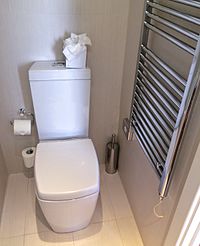
Back مرحاض مزود بنظام شطف Arabic Splachovací záchod Czech Унитаз CV Toilettenspülung German Akvopelilo (necesejo) Esperanto Vesiklosett Estonian سیفون توالت Persian WC Finnish Rinçage des toilettes French מכל הדחה HE
A flush toilet (also known as a flushing toilet, water closet (WC); see also toilet names) is a toilet that disposes of human waste (i.e., urine and feces) by collecting it in a bowl and then using the force of water to channel it ("flush" it) through a drainpipe to another location for treatment, either nearby or at a communal facility. Flush toilets can be designed for sitting or squatting (often regionally differentiated). Most modern sewage treatment systems are also designed to process specially designed toilet paper, and there is increasing interest for flushable wet wipes. Porcelain (sometimes with vitreous china) is a popular material for these toilets, although public or institutional ones may be metal, etc.
Flush toilets are a type of plumbing fixture, and usually incorporate a bend called a trap (S-, U-, J-, or P-shaped) that causes water to collect in the toilet bowl – to hold the waste and act as a seal against noxious sewer gases. Urban and suburban flush toilets are connected to a sewerage system that conveys wastewater to a sewage treatment plant; rurally, a septic tank or composting system is mostly used.[1]
The opposite of a flush toilet is a dry toilet, which uses no water for flushing. Associated devices are urinals, which primarily dispose of urine, and bidets, which use water to cleanse the anus, perineum, and vulva after using the toilet.
- ^ Kagan, Mya. "Where Does the Water Go When I Flush the Toilet?" Kids' Why Questions. Whyzz. Publications LLC, 2011.

